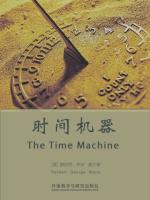"The Time Machine"
H.G. Wells' seminal work, "The Time Machine," first published in 1895, remains a cornerstone of science fiction literature, a testament to the visionary mind of its author. This groundbreaking novella not only introduced the concept of time travel to the world of fiction but also served as a vehicle for Wells' social and political commentary, wrapped in the guise of an enthralling adventure through time.
At the heart of the narrative is the Time Traveller, a brilliant inventor whose audacious creation defies the constraints of linear time. Through his eyes, we witness the evolution of Earth over eons, culminating in the distant future where humanity has diverged into two distinct species: the Eloi, delicate and childlike, living above ground; and the Morlocks, subterranean creatures of darkness and toil. The dichotomy between these beings serves as a stark allegory for the class struggles of Wells' own era, with the Eloi representing the idle rich and the Morlocks the exploited working class.
Wells' prose is crisp and evocative, painting a vivid picture of the far-flung future with its lush gardens and haunting underground passages. His depiction of the Time Traveller's encounters with the future inhabitants is both captivating and unsettling, as he explores themes of societal decay, intellectual stagnation, and the potential pitfalls of technological advancement.
The narrative structure is deceptively simple, unfolding as a series of conversations between the Time Traveller and his skeptical peers, punctuated by the Traveller's thrilling experiences. This framing device adds a layer of realism and immediacy to the fantastical elements of the story, inviting the reader to suspend disbelief and immerse themselves in the possibilities of time travel.
"The Time Machine" is not merely a piece of escapist fiction; it is a thought-provoking examination of the human condition and our relationship with time itself. Wells challenges us to consider the implications of our actions, the legacy we leave behind, and the inexorable passage of time that shapes the world around us.
In conclusion, H.G. Wells' "The Time Machine" is a timeless classic that continues to captivate and provoke readers over a century after its initial publication. Its blend of scientific speculation, social critique, and compelling narrative make it a must-read for anyone interested in the roots of modern science fiction and the enduring power of speculative literature.




 京公网安备 11010802032529号
京公网安备 11010802032529号